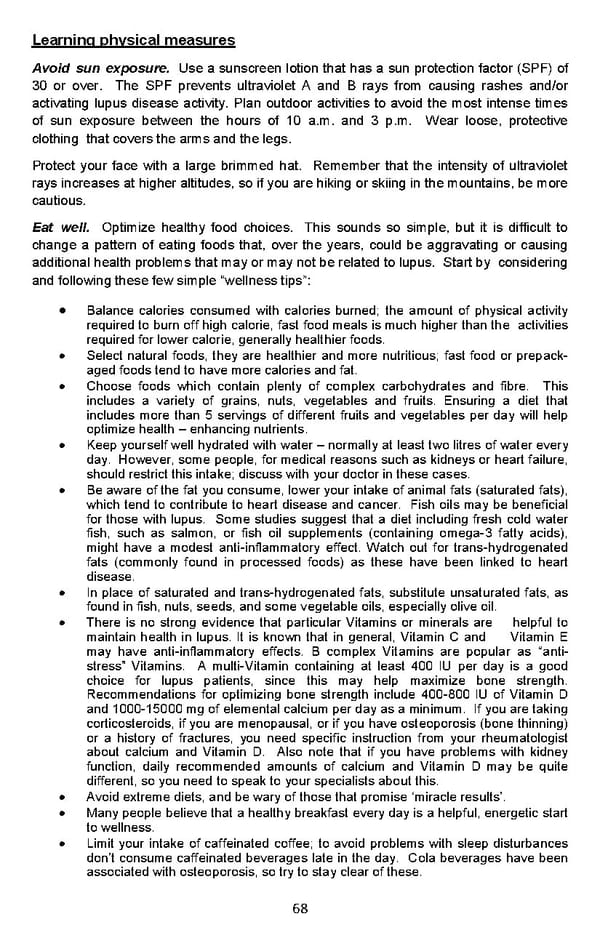Learning physical measures Avoid sun exposure. Use a sunscreen lotion that has a sun protection factor (SPF) of 30 or over. The SPF prevents ultraviolet A and B rays from causing rashes and/or activating lupus disease activity. Plan outdoor activities to avoid the most intense times of sun exposure between the hours of 10 a.m. and 3 p.m. Wear loose, protective clothing that covers the arms and the legs. Protect your face with a large brimmed hat. Remember that the intensity of ultraviolet rays increases at higher altitudes, so if you are hiking or skiing in the mountains, be more cautious. Eat well. Optimize healthy food choices. This sounds so simple, but it is difficult to change a pattern of eating foods that, over the years, could be aggravating or causing additional health problems that may or may not be related to lupus. Start by considering and following these few simple “wellness tips”: • Balance calories consumed with calories burned; the amount of physical activity required to burn off high calorie, fast food meals is much higher than the activities required for lower calorie, generally healthier foods. • Select natural foods, they are healthier and more nutritious; fast food or prepack- aged foods tend to have more calories and fat. • Choose foods which contain plenty of complex carbohydrates and fibre. This includes a variety of grains, nuts, vegetables and fruits. Ensuring a diet that includes more than 5 servings of different fruits and vegetables per day will help optimize health – enhancing nutrients. • Keep yourself well hydrated with water – normally at least two litres of water every day. However, some people, for medical reasons such as kidneys or heart failure, should restrict this intake; discuss with your doctor in these cases. • Be aware of the fat you consume, lower your intake of animal fats (saturated fats), which tend to contribute to heart disease and cancer. Fish oils may be beneficial for those with lupus. Some studies suggest that a diet including fresh cold water fish, such as salmon, or fish oil supplements (containing omega-3 fatty acids), might have a modest anti-inflammatory effect. Watch out for trans-hydrogenated fats (commonly found in processed foods) as these have been linked to heart disease. • In place of saturated and trans-hydrogenated fats, substitute unsaturated fats, as found in fish, nuts, seeds, and some vegetable oils, especially olive oil. • There is no strong evidence that particular Vitamins or minerals are helpful to maintain health in lupus. It is known that in general, Vitamin C and Vitamin E may have anti-inflammatory effects. B complex Vitamins are popular as “anti- stress” Vitamins. A multi-Vitamin containing at least 400 IU per day is a good choice for lupus patients, since this may help maximize bone strength. Recommendations for optimizing bone strength include 400-800 IU of Vitamin D and 1000-15000 mg of elemental calcium per day as a minimum. If you are taking corticosteroids, if you are menopausal, or if you have osteoporosis (bone thinning) or a history of fractures, you need specific instruction from your rheumatologist about calcium and Vitamin D. Also note that if you have problems with kidney function, daily recommended amounts of calcium and Vitamin D may be quite different, so you need to speak to your specialists about this. • Avoid extreme diets, and be wary of those that promise ‘miracle results’. • Many people believe that a healthy breakfast every day is a helpful, energetic start to wellness. • Limit your intake of caffeinated coffee; to avoid problems with sleep disturbances don’t consume caffeinated beverages late in the day. Cola beverages have been associated with osteoporosis, so try to stay clear of these. 68
 Living Well With Lupus Facts Booklet Page 67 Page 69
Living Well With Lupus Facts Booklet Page 67 Page 69